Critical Review of Helping Interaction Using Integrative Approach
VerifiedAdded on 2022/12/29
|8
|2447
|73
Report
AI Summary
This report presents a critical review of a past helping interaction, focusing on the application of an integrative approach to understand and address a colleague's anxiety. The student analyzes the interaction through the lenses of transactional analysis (TA) and cognitive behavioral therapy (CBT). The report explores how the understanding of ego states in TA, specifically the parent, adult, and child ego states, helped in understanding the colleague's anxiety triggered by a new manager and past family experiences. It also examines how CBT, focusing on negative automatic thoughts, aided in identifying and challenging the colleague's thought patterns contributing to stress and anxiety. The student reflects on their role in the interaction, evaluating how these theoretical frameworks informed their responses and interventions. The report concludes by assessing how the integrative approach has enhanced the student's understanding and informed their continuous professional development within the challenges of helping professions.
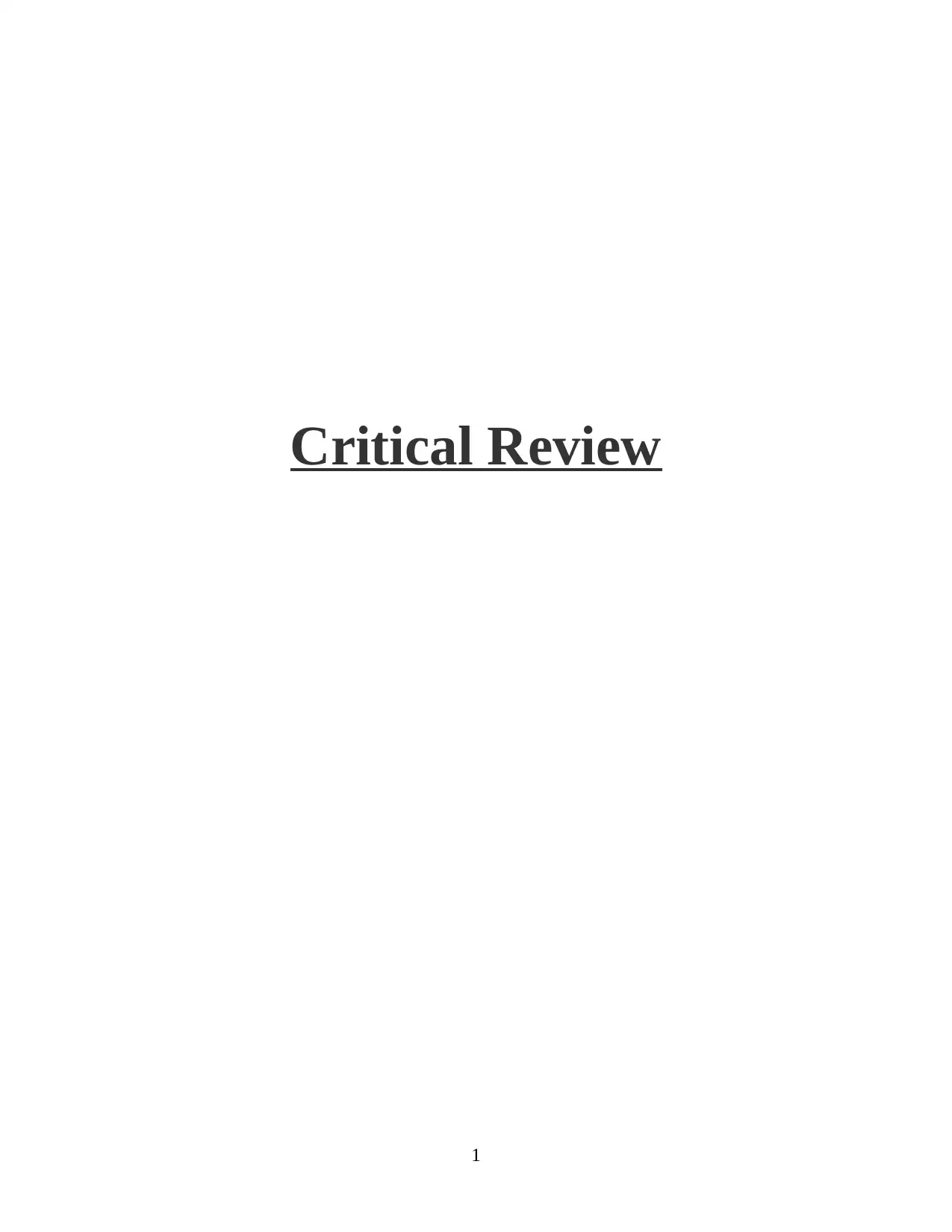
Critical Review
1
1
Paraphrase This Document
Need a fresh take? Get an instant paraphrase of this document with our AI Paraphraser
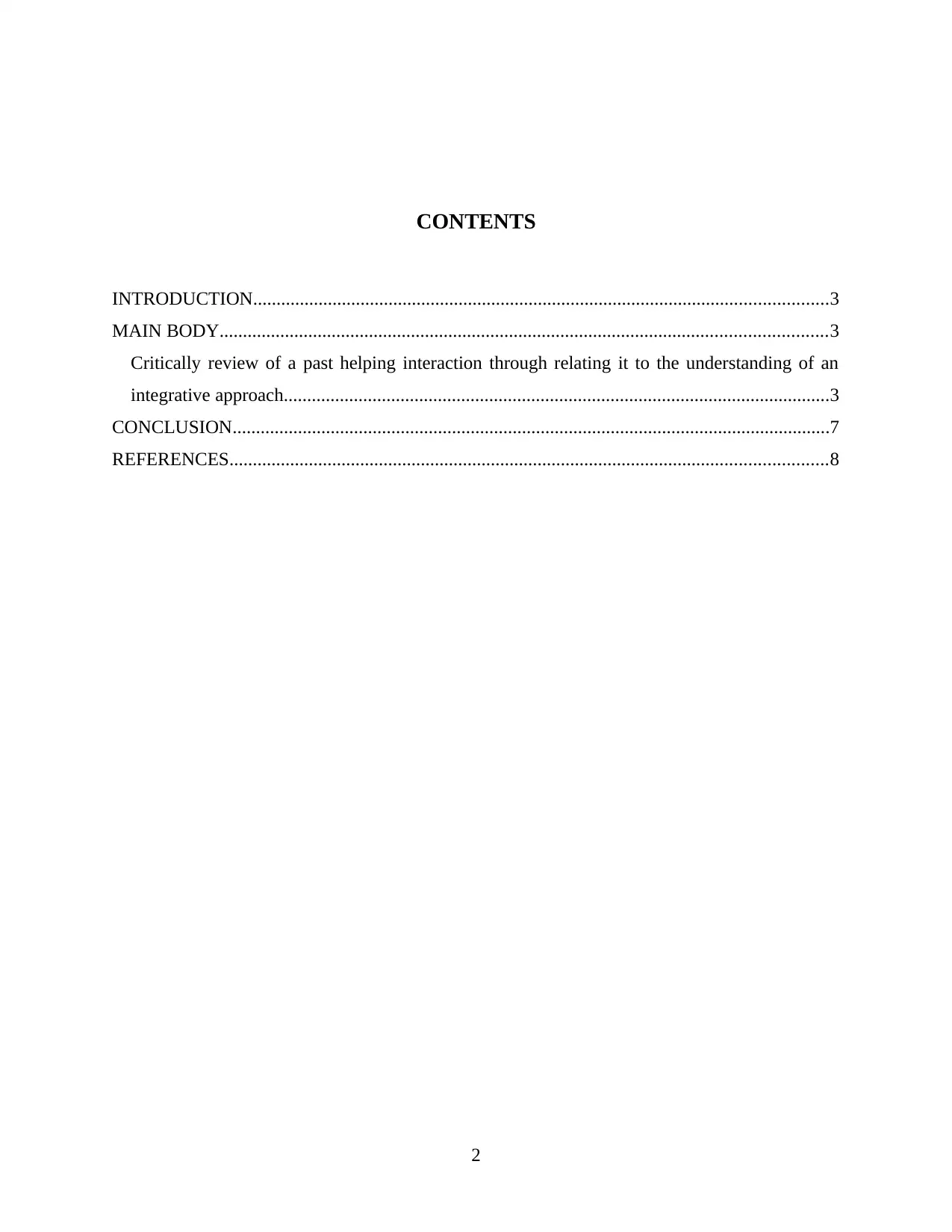
CONTENTS
INTRODUCTION...........................................................................................................................3
MAIN BODY..................................................................................................................................3
Critically review of a past helping interaction through relating it to the understanding of an
integrative approach.....................................................................................................................3
CONCLUSION................................................................................................................................7
REFERENCES................................................................................................................................8
2
INTRODUCTION...........................................................................................................................3
MAIN BODY..................................................................................................................................3
Critically review of a past helping interaction through relating it to the understanding of an
integrative approach.....................................................................................................................3
CONCLUSION................................................................................................................................7
REFERENCES................................................................................................................................8
2
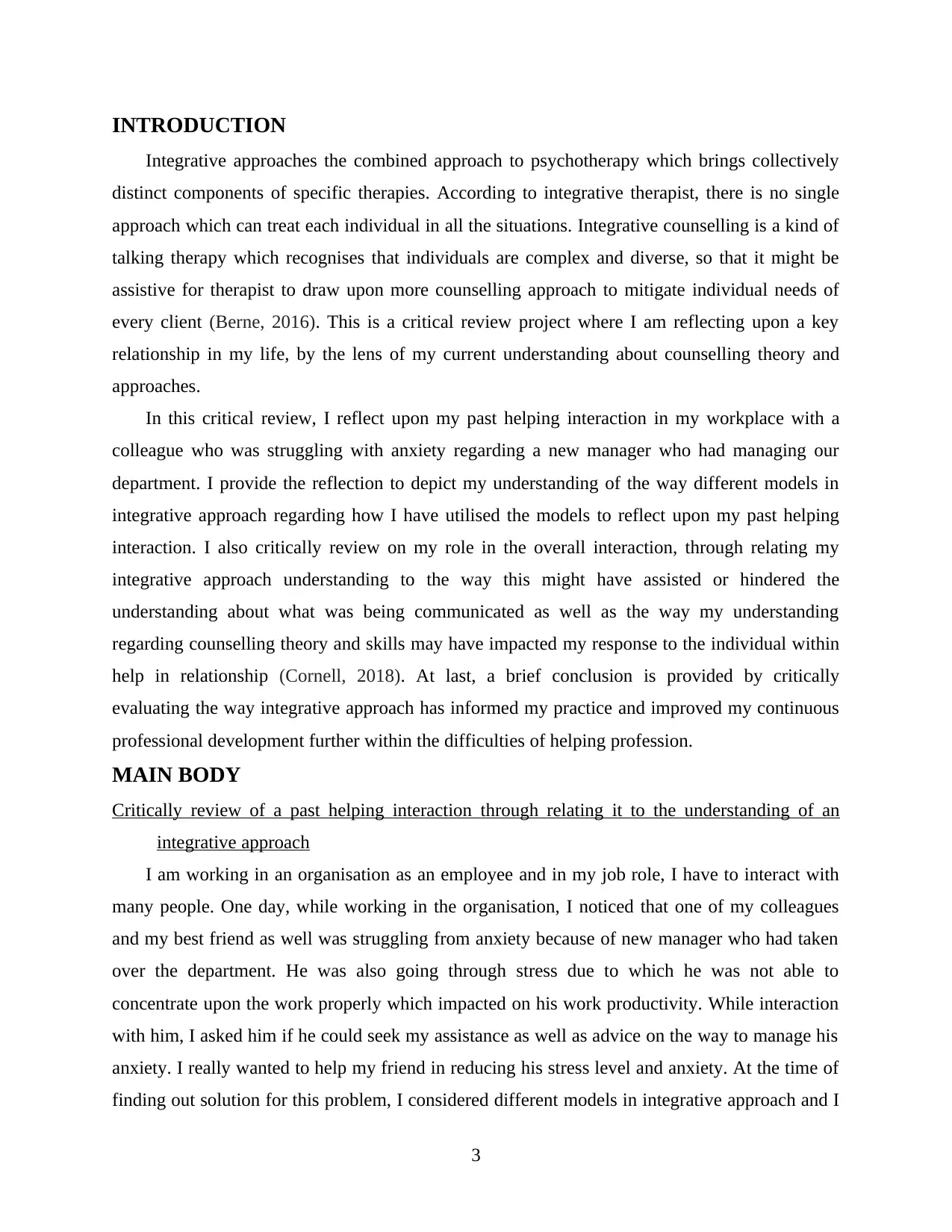
INTRODUCTION
Integrative approaches the combined approach to psychotherapy which brings collectively
distinct components of specific therapies. According to integrative therapist, there is no single
approach which can treat each individual in all the situations. Integrative counselling is a kind of
talking therapy which recognises that individuals are complex and diverse, so that it might be
assistive for therapist to draw upon more counselling approach to mitigate individual needs of
every client (Berne, 2016). This is a critical review project where I am reflecting upon a key
relationship in my life, by the lens of my current understanding about counselling theory and
approaches.
In this critical review, I reflect upon my past helping interaction in my workplace with a
colleague who was struggling with anxiety regarding a new manager who had managing our
department. I provide the reflection to depict my understanding of the way different models in
integrative approach regarding how I have utilised the models to reflect upon my past helping
interaction. I also critically review on my role in the overall interaction, through relating my
integrative approach understanding to the way this might have assisted or hindered the
understanding about what was being communicated as well as the way my understanding
regarding counselling theory and skills may have impacted my response to the individual within
help in relationship (Cornell, 2018). At last, a brief conclusion is provided by critically
evaluating the way integrative approach has informed my practice and improved my continuous
professional development further within the difficulties of helping profession.
MAIN BODY
Critically review of a past helping interaction through relating it to the understanding of an
integrative approach
I am working in an organisation as an employee and in my job role, I have to interact with
many people. One day, while working in the organisation, I noticed that one of my colleagues
and my best friend as well was struggling from anxiety because of new manager who had taken
over the department. He was also going through stress due to which he was not able to
concentrate upon the work properly which impacted on his work productivity. While interaction
with him, I asked him if he could seek my assistance as well as advice on the way to manage his
anxiety. I really wanted to help my friend in reducing his stress level and anxiety. At the time of
finding out solution for this problem, I considered different models in integrative approach and I
3
Integrative approaches the combined approach to psychotherapy which brings collectively
distinct components of specific therapies. According to integrative therapist, there is no single
approach which can treat each individual in all the situations. Integrative counselling is a kind of
talking therapy which recognises that individuals are complex and diverse, so that it might be
assistive for therapist to draw upon more counselling approach to mitigate individual needs of
every client (Berne, 2016). This is a critical review project where I am reflecting upon a key
relationship in my life, by the lens of my current understanding about counselling theory and
approaches.
In this critical review, I reflect upon my past helping interaction in my workplace with a
colleague who was struggling with anxiety regarding a new manager who had managing our
department. I provide the reflection to depict my understanding of the way different models in
integrative approach regarding how I have utilised the models to reflect upon my past helping
interaction. I also critically review on my role in the overall interaction, through relating my
integrative approach understanding to the way this might have assisted or hindered the
understanding about what was being communicated as well as the way my understanding
regarding counselling theory and skills may have impacted my response to the individual within
help in relationship (Cornell, 2018). At last, a brief conclusion is provided by critically
evaluating the way integrative approach has informed my practice and improved my continuous
professional development further within the difficulties of helping profession.
MAIN BODY
Critically review of a past helping interaction through relating it to the understanding of an
integrative approach
I am working in an organisation as an employee and in my job role, I have to interact with
many people. One day, while working in the organisation, I noticed that one of my colleagues
and my best friend as well was struggling from anxiety because of new manager who had taken
over the department. He was also going through stress due to which he was not able to
concentrate upon the work properly which impacted on his work productivity. While interaction
with him, I asked him if he could seek my assistance as well as advice on the way to manage his
anxiety. I really wanted to help my friend in reducing his stress level and anxiety. At the time of
finding out solution for this problem, I considered different models in integrative approach and I
3
⊘ This is a preview!⊘
Do you want full access?
Subscribe today to unlock all pages.

Trusted by 1+ million students worldwide
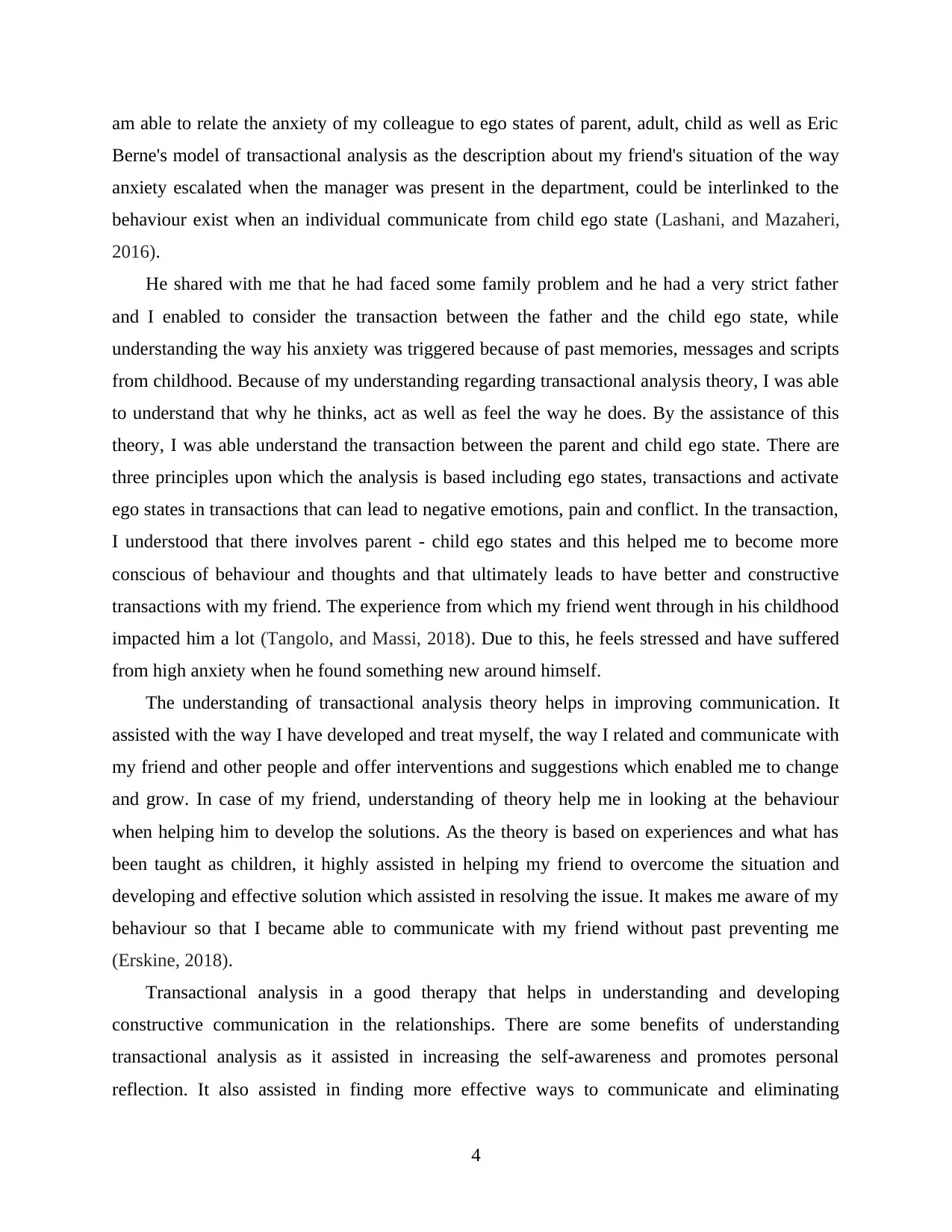
am able to relate the anxiety of my colleague to ego states of parent, adult, child as well as Eric
Berne's model of transactional analysis as the description about my friend's situation of the way
anxiety escalated when the manager was present in the department, could be interlinked to the
behaviour exist when an individual communicate from child ego state (Lashani, and Mazaheri,
2016).
He shared with me that he had faced some family problem and he had a very strict father
and I enabled to consider the transaction between the father and the child ego state, while
understanding the way his anxiety was triggered because of past memories, messages and scripts
from childhood. Because of my understanding regarding transactional analysis theory, I was able
to understand that why he thinks, act as well as feel the way he does. By the assistance of this
theory, I was able understand the transaction between the parent and child ego state. There are
three principles upon which the analysis is based including ego states, transactions and activate
ego states in transactions that can lead to negative emotions, pain and conflict. In the transaction,
I understood that there involves parent - child ego states and this helped me to become more
conscious of behaviour and thoughts and that ultimately leads to have better and constructive
transactions with my friend. The experience from which my friend went through in his childhood
impacted him a lot (Tangolo, and Massi, 2018). Due to this, he feels stressed and have suffered
from high anxiety when he found something new around himself.
The understanding of transactional analysis theory helps in improving communication. It
assisted with the way I have developed and treat myself, the way I related and communicate with
my friend and other people and offer interventions and suggestions which enabled me to change
and grow. In case of my friend, understanding of theory help me in looking at the behaviour
when helping him to develop the solutions. As the theory is based on experiences and what has
been taught as children, it highly assisted in helping my friend to overcome the situation and
developing and effective solution which assisted in resolving the issue. It makes me aware of my
behaviour so that I became able to communicate with my friend without past preventing me
(Erskine, 2018).
Transactional analysis in a good therapy that helps in understanding and developing
constructive communication in the relationships. There are some benefits of understanding
transactional analysis as it assisted in increasing the self-awareness and promotes personal
reflection. It also assisted in finding more effective ways to communicate and eliminating
4
Berne's model of transactional analysis as the description about my friend's situation of the way
anxiety escalated when the manager was present in the department, could be interlinked to the
behaviour exist when an individual communicate from child ego state (Lashani, and Mazaheri,
2016).
He shared with me that he had faced some family problem and he had a very strict father
and I enabled to consider the transaction between the father and the child ego state, while
understanding the way his anxiety was triggered because of past memories, messages and scripts
from childhood. Because of my understanding regarding transactional analysis theory, I was able
to understand that why he thinks, act as well as feel the way he does. By the assistance of this
theory, I was able understand the transaction between the parent and child ego state. There are
three principles upon which the analysis is based including ego states, transactions and activate
ego states in transactions that can lead to negative emotions, pain and conflict. In the transaction,
I understood that there involves parent - child ego states and this helped me to become more
conscious of behaviour and thoughts and that ultimately leads to have better and constructive
transactions with my friend. The experience from which my friend went through in his childhood
impacted him a lot (Tangolo, and Massi, 2018). Due to this, he feels stressed and have suffered
from high anxiety when he found something new around himself.
The understanding of transactional analysis theory helps in improving communication. It
assisted with the way I have developed and treat myself, the way I related and communicate with
my friend and other people and offer interventions and suggestions which enabled me to change
and grow. In case of my friend, understanding of theory help me in looking at the behaviour
when helping him to develop the solutions. As the theory is based on experiences and what has
been taught as children, it highly assisted in helping my friend to overcome the situation and
developing and effective solution which assisted in resolving the issue. It makes me aware of my
behaviour so that I became able to communicate with my friend without past preventing me
(Erskine, 2018).
Transactional analysis in a good therapy that helps in understanding and developing
constructive communication in the relationships. There are some benefits of understanding
transactional analysis as it assisted in increasing the self-awareness and promotes personal
reflection. It also assisted in finding more effective ways to communicate and eliminating
4
Paraphrase This Document
Need a fresh take? Get an instant paraphrase of this document with our AI Paraphraser
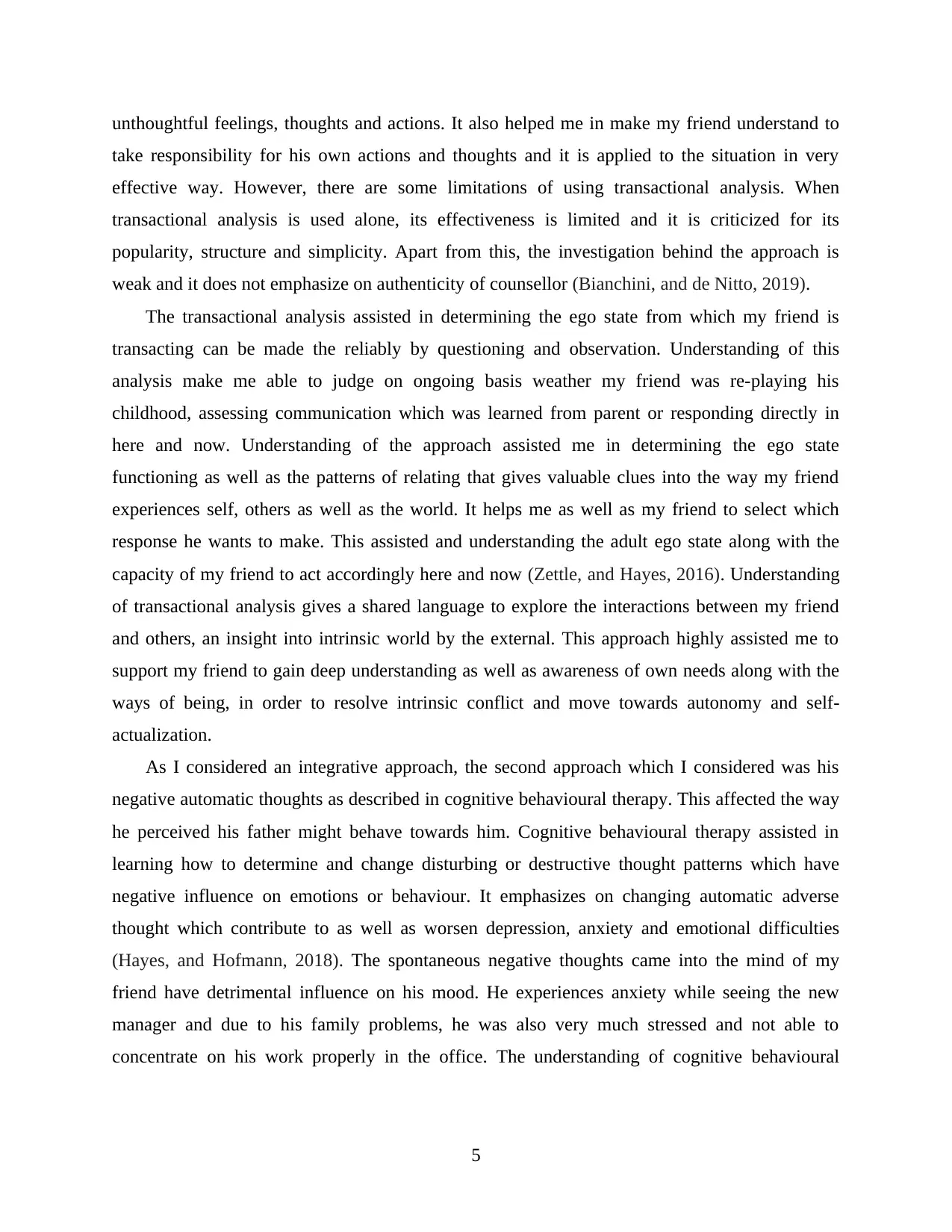
unthoughtful feelings, thoughts and actions. It also helped me in make my friend understand to
take responsibility for his own actions and thoughts and it is applied to the situation in very
effective way. However, there are some limitations of using transactional analysis. When
transactional analysis is used alone, its effectiveness is limited and it is criticized for its
popularity, structure and simplicity. Apart from this, the investigation behind the approach is
weak and it does not emphasize on authenticity of counsellor (Bianchini, and de Nitto, 2019).
The transactional analysis assisted in determining the ego state from which my friend is
transacting can be made the reliably by questioning and observation. Understanding of this
analysis make me able to judge on ongoing basis weather my friend was re-playing his
childhood, assessing communication which was learned from parent or responding directly in
here and now. Understanding of the approach assisted me in determining the ego state
functioning as well as the patterns of relating that gives valuable clues into the way my friend
experiences self, others as well as the world. It helps me as well as my friend to select which
response he wants to make. This assisted and understanding the adult ego state along with the
capacity of my friend to act accordingly here and now (Zettle, and Hayes, 2016). Understanding
of transactional analysis gives a shared language to explore the interactions between my friend
and others, an insight into intrinsic world by the external. This approach highly assisted me to
support my friend to gain deep understanding as well as awareness of own needs along with the
ways of being, in order to resolve intrinsic conflict and move towards autonomy and self-
actualization.
As I considered an integrative approach, the second approach which I considered was his
negative automatic thoughts as described in cognitive behavioural therapy. This affected the way
he perceived his father might behave towards him. Cognitive behavioural therapy assisted in
learning how to determine and change disturbing or destructive thought patterns which have
negative influence on emotions or behaviour. It emphasizes on changing automatic adverse
thought which contribute to as well as worsen depression, anxiety and emotional difficulties
(Hayes, and Hofmann, 2018). The spontaneous negative thoughts came into the mind of my
friend have detrimental influence on his mood. He experiences anxiety while seeing the new
manager and due to his family problems, he was also very much stressed and not able to
concentrate on his work properly in the office. The understanding of cognitive behavioural
5
take responsibility for his own actions and thoughts and it is applied to the situation in very
effective way. However, there are some limitations of using transactional analysis. When
transactional analysis is used alone, its effectiveness is limited and it is criticized for its
popularity, structure and simplicity. Apart from this, the investigation behind the approach is
weak and it does not emphasize on authenticity of counsellor (Bianchini, and de Nitto, 2019).
The transactional analysis assisted in determining the ego state from which my friend is
transacting can be made the reliably by questioning and observation. Understanding of this
analysis make me able to judge on ongoing basis weather my friend was re-playing his
childhood, assessing communication which was learned from parent or responding directly in
here and now. Understanding of the approach assisted me in determining the ego state
functioning as well as the patterns of relating that gives valuable clues into the way my friend
experiences self, others as well as the world. It helps me as well as my friend to select which
response he wants to make. This assisted and understanding the adult ego state along with the
capacity of my friend to act accordingly here and now (Zettle, and Hayes, 2016). Understanding
of transactional analysis gives a shared language to explore the interactions between my friend
and others, an insight into intrinsic world by the external. This approach highly assisted me to
support my friend to gain deep understanding as well as awareness of own needs along with the
ways of being, in order to resolve intrinsic conflict and move towards autonomy and self-
actualization.
As I considered an integrative approach, the second approach which I considered was his
negative automatic thoughts as described in cognitive behavioural therapy. This affected the way
he perceived his father might behave towards him. Cognitive behavioural therapy assisted in
learning how to determine and change disturbing or destructive thought patterns which have
negative influence on emotions or behaviour. It emphasizes on changing automatic adverse
thought which contribute to as well as worsen depression, anxiety and emotional difficulties
(Hayes, and Hofmann, 2018). The spontaneous negative thoughts came into the mind of my
friend have detrimental influence on his mood. He experiences anxiety while seeing the new
manager and due to his family problems, he was also very much stressed and not able to
concentrate on his work properly in the office. The understanding of cognitive behavioural
5
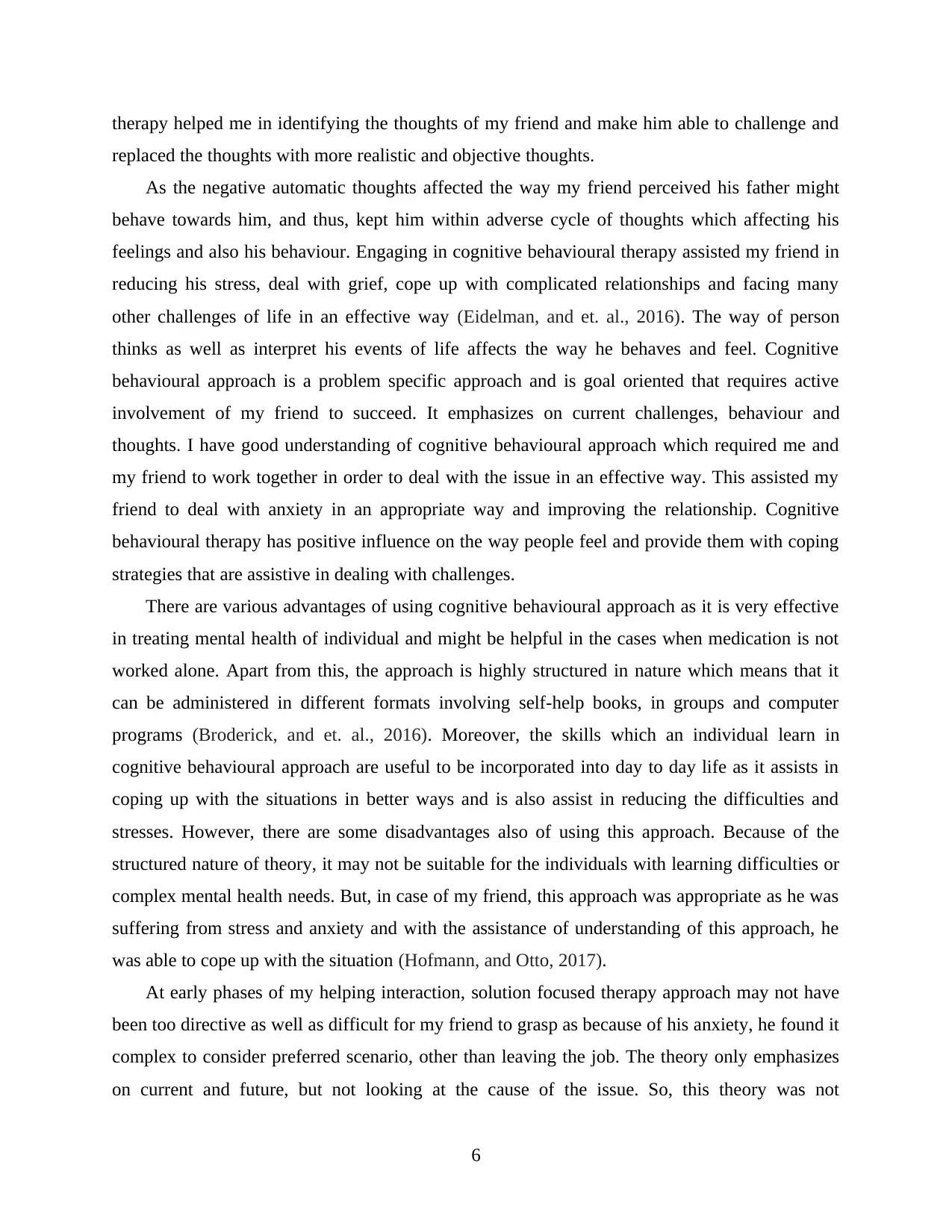
therapy helped me in identifying the thoughts of my friend and make him able to challenge and
replaced the thoughts with more realistic and objective thoughts.
As the negative automatic thoughts affected the way my friend perceived his father might
behave towards him, and thus, kept him within adverse cycle of thoughts which affecting his
feelings and also his behaviour. Engaging in cognitive behavioural therapy assisted my friend in
reducing his stress, deal with grief, cope up with complicated relationships and facing many
other challenges of life in an effective way (Eidelman, and et. al., 2016). The way of person
thinks as well as interpret his events of life affects the way he behaves and feel. Cognitive
behavioural approach is a problem specific approach and is goal oriented that requires active
involvement of my friend to succeed. It emphasizes on current challenges, behaviour and
thoughts. I have good understanding of cognitive behavioural approach which required me and
my friend to work together in order to deal with the issue in an effective way. This assisted my
friend to deal with anxiety in an appropriate way and improving the relationship. Cognitive
behavioural therapy has positive influence on the way people feel and provide them with coping
strategies that are assistive in dealing with challenges.
There are various advantages of using cognitive behavioural approach as it is very effective
in treating mental health of individual and might be helpful in the cases when medication is not
worked alone. Apart from this, the approach is highly structured in nature which means that it
can be administered in different formats involving self-help books, in groups and computer
programs (Broderick, and et. al., 2016). Moreover, the skills which an individual learn in
cognitive behavioural approach are useful to be incorporated into day to day life as it assists in
coping up with the situations in better ways and is also assist in reducing the difficulties and
stresses. However, there are some disadvantages also of using this approach. Because of the
structured nature of theory, it may not be suitable for the individuals with learning difficulties or
complex mental health needs. But, in case of my friend, this approach was appropriate as he was
suffering from stress and anxiety and with the assistance of understanding of this approach, he
was able to cope up with the situation (Hofmann, and Otto, 2017).
At early phases of my helping interaction, solution focused therapy approach may not have
been too directive as well as difficult for my friend to grasp as because of his anxiety, he found it
complex to consider preferred scenario, other than leaving the job. The theory only emphasizes
on current and future, but not looking at the cause of the issue. So, this theory was not
6
replaced the thoughts with more realistic and objective thoughts.
As the negative automatic thoughts affected the way my friend perceived his father might
behave towards him, and thus, kept him within adverse cycle of thoughts which affecting his
feelings and also his behaviour. Engaging in cognitive behavioural therapy assisted my friend in
reducing his stress, deal with grief, cope up with complicated relationships and facing many
other challenges of life in an effective way (Eidelman, and et. al., 2016). The way of person
thinks as well as interpret his events of life affects the way he behaves and feel. Cognitive
behavioural approach is a problem specific approach and is goal oriented that requires active
involvement of my friend to succeed. It emphasizes on current challenges, behaviour and
thoughts. I have good understanding of cognitive behavioural approach which required me and
my friend to work together in order to deal with the issue in an effective way. This assisted my
friend to deal with anxiety in an appropriate way and improving the relationship. Cognitive
behavioural therapy has positive influence on the way people feel and provide them with coping
strategies that are assistive in dealing with challenges.
There are various advantages of using cognitive behavioural approach as it is very effective
in treating mental health of individual and might be helpful in the cases when medication is not
worked alone. Apart from this, the approach is highly structured in nature which means that it
can be administered in different formats involving self-help books, in groups and computer
programs (Broderick, and et. al., 2016). Moreover, the skills which an individual learn in
cognitive behavioural approach are useful to be incorporated into day to day life as it assists in
coping up with the situations in better ways and is also assist in reducing the difficulties and
stresses. However, there are some disadvantages also of using this approach. Because of the
structured nature of theory, it may not be suitable for the individuals with learning difficulties or
complex mental health needs. But, in case of my friend, this approach was appropriate as he was
suffering from stress and anxiety and with the assistance of understanding of this approach, he
was able to cope up with the situation (Hofmann, and Otto, 2017).
At early phases of my helping interaction, solution focused therapy approach may not have
been too directive as well as difficult for my friend to grasp as because of his anxiety, he found it
complex to consider preferred scenario, other than leaving the job. The theory only emphasizes
on current and future, but not looking at the cause of the issue. So, this theory was not
6
⊘ This is a preview!⊘
Do you want full access?
Subscribe today to unlock all pages.

Trusted by 1+ million students worldwide
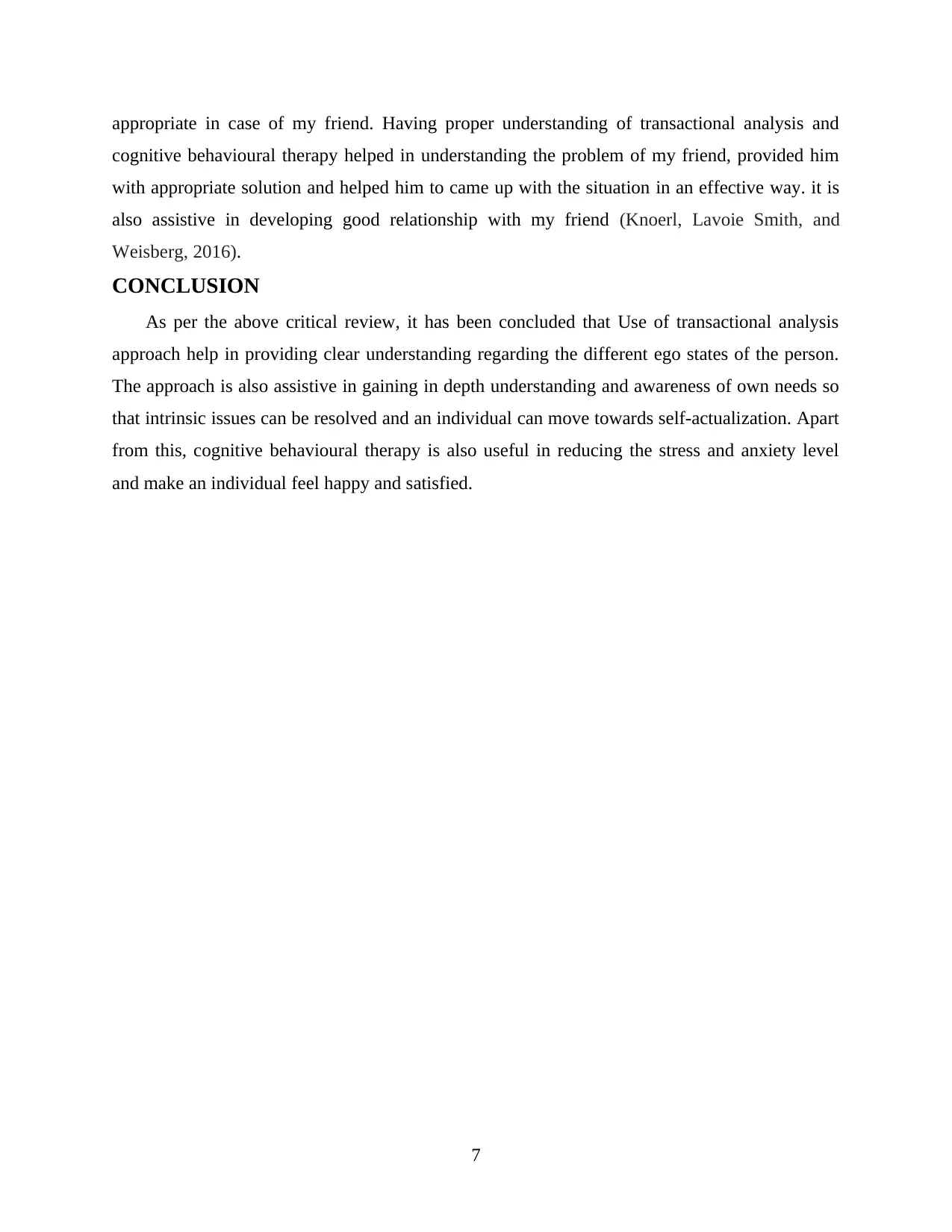
appropriate in case of my friend. Having proper understanding of transactional analysis and
cognitive behavioural therapy helped in understanding the problem of my friend, provided him
with appropriate solution and helped him to came up with the situation in an effective way. it is
also assistive in developing good relationship with my friend (Knoerl, Lavoie Smith, and
Weisberg, 2016).
CONCLUSION
As per the above critical review, it has been concluded that Use of transactional analysis
approach help in providing clear understanding regarding the different ego states of the person.
The approach is also assistive in gaining in depth understanding and awareness of own needs so
that intrinsic issues can be resolved and an individual can move towards self-actualization. Apart
from this, cognitive behavioural therapy is also useful in reducing the stress and anxiety level
and make an individual feel happy and satisfied.
7
cognitive behavioural therapy helped in understanding the problem of my friend, provided him
with appropriate solution and helped him to came up with the situation in an effective way. it is
also assistive in developing good relationship with my friend (Knoerl, Lavoie Smith, and
Weisberg, 2016).
CONCLUSION
As per the above critical review, it has been concluded that Use of transactional analysis
approach help in providing clear understanding regarding the different ego states of the person.
The approach is also assistive in gaining in depth understanding and awareness of own needs so
that intrinsic issues can be resolved and an individual can move towards self-actualization. Apart
from this, cognitive behavioural therapy is also useful in reducing the stress and anxiety level
and make an individual feel happy and satisfied.
7
Paraphrase This Document
Need a fresh take? Get an instant paraphrase of this document with our AI Paraphraser
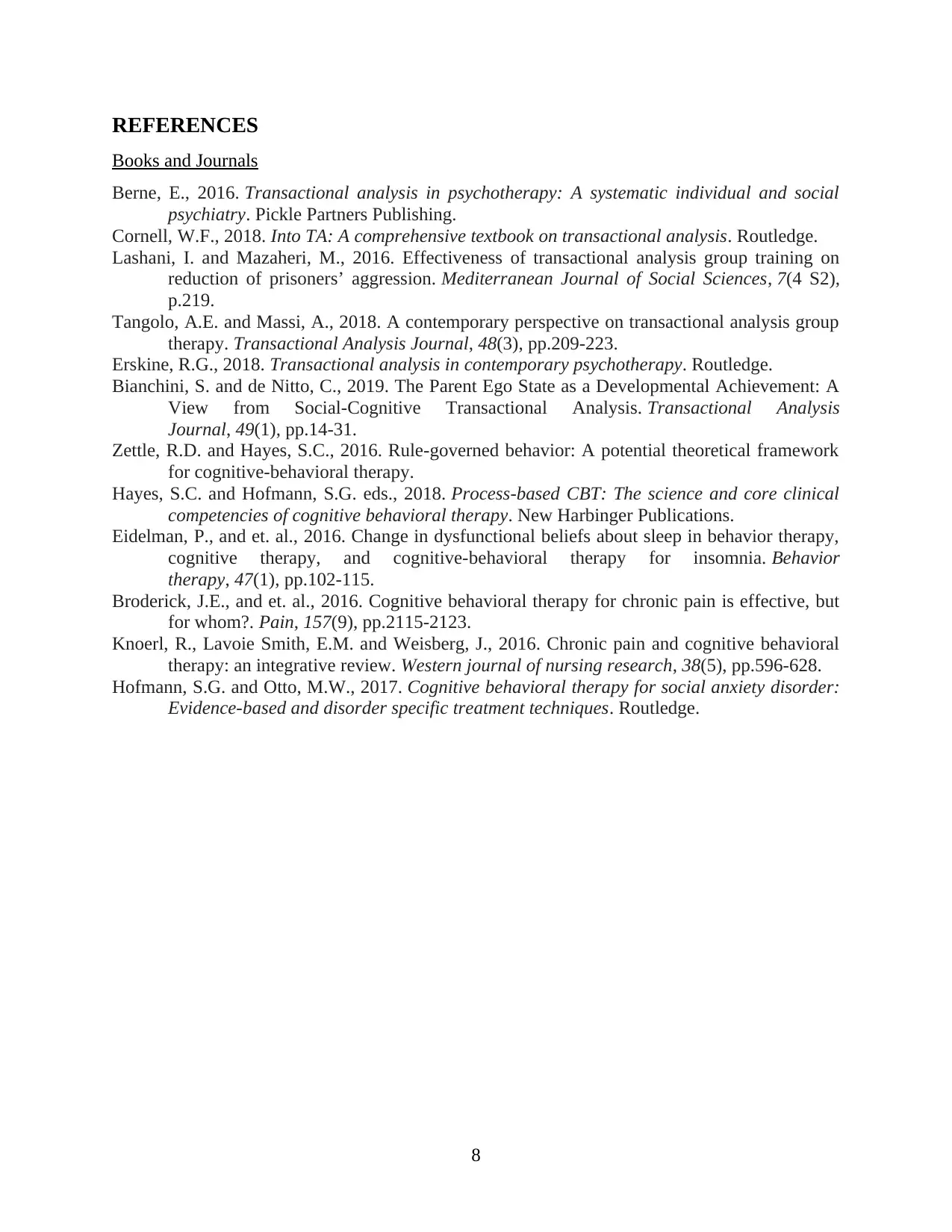
REFERENCES
Books and Journals
Berne, E., 2016. Transactional analysis in psychotherapy: A systematic individual and social
psychiatry. Pickle Partners Publishing.
Cornell, W.F., 2018. Into TA: A comprehensive textbook on transactional analysis. Routledge.
Lashani, I. and Mazaheri, M., 2016. Effectiveness of transactional analysis group training on
reduction of prisoners’ aggression. Mediterranean Journal of Social Sciences, 7(4 S2),
p.219.
Tangolo, A.E. and Massi, A., 2018. A contemporary perspective on transactional analysis group
therapy. Transactional Analysis Journal, 48(3), pp.209-223.
Erskine, R.G., 2018. Transactional analysis in contemporary psychotherapy. Routledge.
Bianchini, S. and de Nitto, C., 2019. The Parent Ego State as a Developmental Achievement: A
View from Social-Cognitive Transactional Analysis. Transactional Analysis
Journal, 49(1), pp.14-31.
Zettle, R.D. and Hayes, S.C., 2016. Rule-governed behavior: A potential theoretical framework
for cognitive-behavioral therapy.
Hayes, S.C. and Hofmann, S.G. eds., 2018. Process-based CBT: The science and core clinical
competencies of cognitive behavioral therapy. New Harbinger Publications.
Eidelman, P., and et. al., 2016. Change in dysfunctional beliefs about sleep in behavior therapy,
cognitive therapy, and cognitive-behavioral therapy for insomnia. Behavior
therapy, 47(1), pp.102-115.
Broderick, J.E., and et. al., 2016. Cognitive behavioral therapy for chronic pain is effective, but
for whom?. Pain, 157(9), pp.2115-2123.
Knoerl, R., Lavoie Smith, E.M. and Weisberg, J., 2016. Chronic pain and cognitive behavioral
therapy: an integrative review. Western journal of nursing research, 38(5), pp.596-628.
Hofmann, S.G. and Otto, M.W., 2017. Cognitive behavioral therapy for social anxiety disorder:
Evidence-based and disorder specific treatment techniques. Routledge.
8
Books and Journals
Berne, E., 2016. Transactional analysis in psychotherapy: A systematic individual and social
psychiatry. Pickle Partners Publishing.
Cornell, W.F., 2018. Into TA: A comprehensive textbook on transactional analysis. Routledge.
Lashani, I. and Mazaheri, M., 2016. Effectiveness of transactional analysis group training on
reduction of prisoners’ aggression. Mediterranean Journal of Social Sciences, 7(4 S2),
p.219.
Tangolo, A.E. and Massi, A., 2018. A contemporary perspective on transactional analysis group
therapy. Transactional Analysis Journal, 48(3), pp.209-223.
Erskine, R.G., 2018. Transactional analysis in contemporary psychotherapy. Routledge.
Bianchini, S. and de Nitto, C., 2019. The Parent Ego State as a Developmental Achievement: A
View from Social-Cognitive Transactional Analysis. Transactional Analysis
Journal, 49(1), pp.14-31.
Zettle, R.D. and Hayes, S.C., 2016. Rule-governed behavior: A potential theoretical framework
for cognitive-behavioral therapy.
Hayes, S.C. and Hofmann, S.G. eds., 2018. Process-based CBT: The science and core clinical
competencies of cognitive behavioral therapy. New Harbinger Publications.
Eidelman, P., and et. al., 2016. Change in dysfunctional beliefs about sleep in behavior therapy,
cognitive therapy, and cognitive-behavioral therapy for insomnia. Behavior
therapy, 47(1), pp.102-115.
Broderick, J.E., and et. al., 2016. Cognitive behavioral therapy for chronic pain is effective, but
for whom?. Pain, 157(9), pp.2115-2123.
Knoerl, R., Lavoie Smith, E.M. and Weisberg, J., 2016. Chronic pain and cognitive behavioral
therapy: an integrative review. Western journal of nursing research, 38(5), pp.596-628.
Hofmann, S.G. and Otto, M.W., 2017. Cognitive behavioral therapy for social anxiety disorder:
Evidence-based and disorder specific treatment techniques. Routledge.
8
1 out of 8
Related Documents
Your All-in-One AI-Powered Toolkit for Academic Success.
+13062052269
info@desklib.com
Available 24*7 on WhatsApp / Email
![[object Object]](/_next/static/media/star-bottom.7253800d.svg)
Unlock your academic potential
Copyright © 2020–2026 A2Z Services. All Rights Reserved. Developed and managed by ZUCOL.



